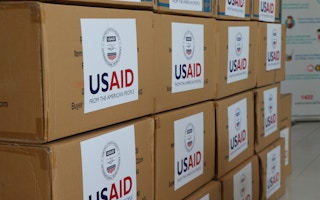As President Donald Trump eyes (or defies) a court ruling ordering his freeze on foreign aid to be lifted, he should take this rare opportunity to increase US engagement with other countries through reformed and less costly aid to keep America safe and prosperous.
An obscure part of US foreign aid that I participated in for the last 25 years reveals the benefits to America far beyond its focus: combating global nature crime.
For several decades, the US has been providing support to lesser developed countries to reduce rampant and lucrative black market trades in wildlife, timber and fish.
I led USAID programmes in Asia for a dozen years to help governments form high-level policies to combat these nature crimes. From 1999-2024, my staff and I led complementary State Department and US Fish and Wildlife Service (FWS) projects in Asia, Africa and Latin America to form and train counter-nature crimes task forces to implement those government policies.
We and other US grantees have been doing more than saving animals, trees and coral reefs in faraway lands. We’ve been helping governments, including the United States, locate, disrupt and dismantle transnational criminal rings that are raking in more than US$20 billion a year on wildlife trafficking alone, and upwards of US$300 billion a year when you add illegal logging and fishing.
I’d have to write a book (and I’m trying) about why this matters to Americans. But here are some key points.
These criminal rings are getting stronger thanks to nature crime profits, and they are also involved in human, drugs, and arms trafficking. They have links into the United States and are laundering hundreds of millions of US dollars.
They are targeting American wildlife too, including bears, sturgeon, eagles, and more.
The task forces we’ve formed and trained in poorer countries to stop these crooks are getting better at stopping all illegal trade. Improved detection at foreign ports undermines piracy and smuggling, providing a fairer footing for US exports.
We’re preventing pandemics. We help rangers stop illegal logging, and border police stop shipments of “high risk” species. Both these actions help mitigate zoonotic outbreaks that are often sparked by wildlife trade and destruction of wildlife habitats.
We’re attacking another big disease - corruption. Officers getting our professional support remember who helped them as they climb their career ladders and become good American allies.
“
USAID needs a shake-up. Not a bullet in the head. The Trump administration can apply their own version of Forward Reform, ask Congress to go easier on compliance strings and recognise that many US agencies are already channelling support efficiently.
When the freeze hit, we were in the midst of convening carefully selected law enforcement officers in Southeast Asia, Africa and Latin America to share intelligence on global criminal rings that threaten people, economies and natural resources in all of our countries.
When we did this on previous occasions, officers arrested dozens of criminals and seized millions in illicit assets in places like Thailand, South Africa, and Argentina and opened investigations into links with the US
The positive impacts reverberate. We have seen critically endangered species, such as tigers, rhinos, elephants, and jaguars, starting to come back, and witnessed better international cooperation to fight transboundary crime.
We need to get back to work.
Reform is needed
Shouldn’t these governments be doing this work on their own, one might ask? Yes, and they are doing more than before but many governments remain poor, so good officers are only able to keep pace with sophisticated crime groups through the advanced training, technology and travel support that we provide (along with our watchful eyes to protect them from corruption).
It will be another 5-10 years before some countries can front their own nature protection and counter-mafia programmes without help. Meanwhile, our assistance has been paying off at a cost that is negligible to US taxpayers.
That is where reform comes in. US-sponsored programmes run by frontline groups are not expensive: they cost US$100,000-US$2 million over several years.
Over the past 10 years, I’ve witnessed more USAID funding being channelled to large development companies that have good technical experts, who capably file onerous reports, but pocket 50-70 per cent of the contracts, worth between US$25 million to US$100 million.
Why so much?
Well, they’re profit-making companies for one thing. But also, USAID implementers have to hire people who understand the long list of regulations, mandated by Congress, that accompany each contract.
It was not always like that. A former USAID administrator, Rajiv Shah had a policy called “Forward Reform”, in which he moved the agency’s funds to frontline groups like ours, which required less money because we charged 5-10 per cent for overheads and trained local staff to run most operations. And we got more done.
Then the development sector lobbied Congress to change the rules back in their favour and the gravy trained resumed in 2015. This was not a partisan thing.
In fact, counter-wildlife trafficking was championed mainly by Republicans. And development mercenaries have profited under both Democratic and Republican administrations.
So, yes, USAID needs a shake-up. Not a bullet in the head. The Trump administration can apply their own version of Forward Reform, ask Congress to go easier on compliance strings, and recognise that many US agencies are already channelling support efficiently.
If we can save time, money and lives through international nature protection programmes, imagine the positive impacts that humanitarian, security, and health programmes can have. All these issues are connected. As is the United States with the global community.
The sooner we lift the freeze, coupled with reform that favours efficient, impactful frontline efforts, the better and longer we keep America safe and prosperous. The US could also set the new global model for international aid.
This story was published with permission from Thomson Reuters Foundation, the charitable arm of Thomson Reuters, that covers humanitarian news, climate change, resilience, women’s rights, trafficking and property rights. Visit https://www.context.news/.









